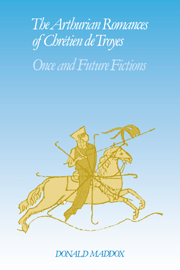Book contents
- Frontmatter
- Contents
- Acknowledgments
- List of abbreviations
- Introduction
- 1 Rex quondam: Arthurian tradition and the anterior order
- 2 Safely through the realm: customs in Le Chevalier de la charrete
- 3 Tenir terre: customs in Le Chevalier au lion
- 4 Rexque futurus: the anterior order in Le Conte du graal
- 5 Arthurian intertextuality: crisis and custom
- Conclusion: Literary customs and the socio-historical question
- Notes
- Bibliography
- Index
3 - Tenir terre: customs in Le Chevalier au lion
Published online by Cambridge University Press: 07 October 2011
- Frontmatter
- Contents
- Acknowledgments
- List of abbreviations
- Introduction
- 1 Rex quondam: Arthurian tradition and the anterior order
- 2 Safely through the realm: customs in Le Chevalier de la charrete
- 3 Tenir terre: customs in Le Chevalier au lion
- 4 Rexque futurus: the anterior order in Le Conte du graal
- 5 Arthurian intertextuality: crisis and custom
- Conclusion: Literary customs and the socio-historical question
- Notes
- Bibliography
- Index
Summary
Customs, we have seen, are prominently involved in the exposition and resolution of one major Arthurian crisis in Erec et Enide and in Le Chevalier de la charrete. In each crisis two distinct, highly detailed customs come to the fore, one an Arthurian practice of long standing, the other apparently of more recent origin and maintained by a social entity geographically distant from Arthur's court. Despite this Spatial disjunction, the two are brought into a crucial relationship. In Erec, this formula is confined to “Li premiers vers,” where Arthur's inability to complete a re-enactment of the Custom of the White Stag because of the ominous procedural deadlock at court contrasts with Erec's successful engagement in the remote Custom of the Sparrowhawk; Erec's triumph in this chivalric and noble analogue of the monarch's hereditary obligation will ultimately provide a satisfactory basis for the latter's completion, as well as for resolution of this initial crisis. In the Charrete, on the other hand, the formula is extended to the global narrative dimensions of the work. The crisis erupts in the opening lines, as Meleagant boldly proposes a confrontation under the jurisdiction of the Custom of Logres in order to strengthen and perpetuate the jurisdiction of the Custom of Gorre; resolution of this crisis does not occur until the ultimate heroic function in the narrative trajectory is completed, when Lancelot decapitates the founder of the Custom of Gorre and the abuser of the Custom of Logres.
- Type
- Chapter
- Information
- The Arthurian Romances of Chrétien de TroyesOnce and Future Fictions, pp. 54 - 81Publisher: Cambridge University PressPrint publication year: 1991



